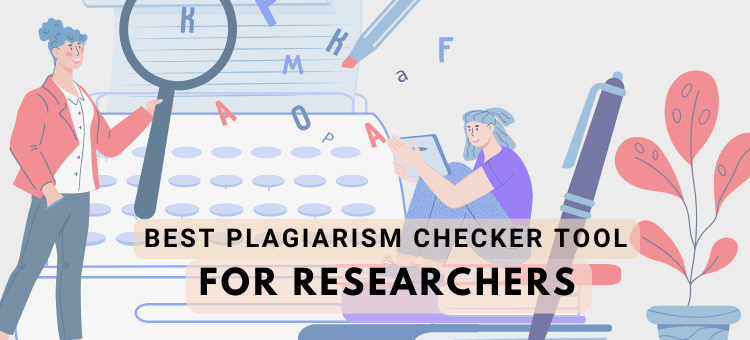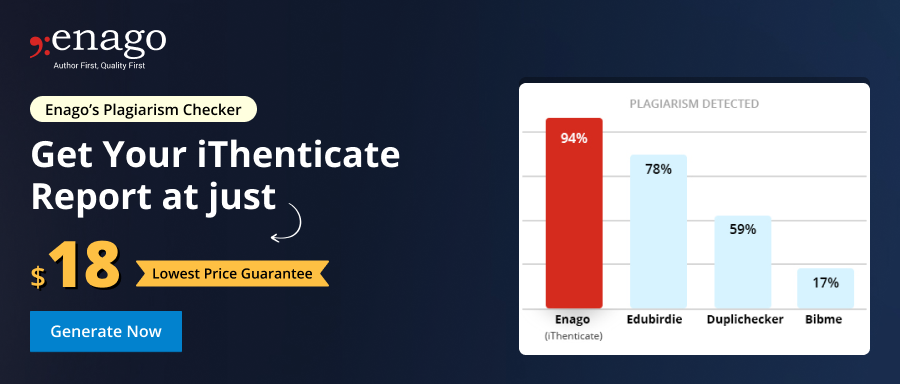Best Plagiarism Checker Tool for Researchers

While common writing issues like language enhancement, punctuation errors, grammatical errors, etc. can be dealt with the help of proofreading tools and editing services, the pervasive concern of plagiarism is difficult to tackle. This unethical act is a serious concern among writers, students, researchers, and other academics. Hence, the need for plagiarism checkers is in high demand to make your academic paper unique.
Why Should I Use a Plagiarism Checker?
Plagiarism is a non-forgivable offense, especially in academia. Moreover, if caught (which is easily possible with the use of the best plagiarism checkers) can lead to researchers jeopardizing their reputation in the field, getting expelled, or even being terminated from their respective universities.
Research papers and any form of documentation require you to do thorough research, develop the structure, and follow the provided guidelines. A lot of people prefer to renounce all the hassle, and that’s where things go wrong. Plagiarism is not always an intentional act. It could be a result of ignorance, poor time management, confusion about what constitutes plagiarism, etc. However, this could be easily avoided by using an online plagiarism checker.
You should use the best plagiarism checker and scan your papers because:
- Openly available resources available through plagiarism checkers detect plagiarism comprehensively.
- It highlights exact plagiarized content for easier navigation.
- Plagiarism checkers often provide percentage matches.
- Most plagiarism checkers detect incorrectly paraphrased content as well.
- The use of plagiarism checker tools displays the honest intentions of the writer.
How to Choose the Best Plagiarism Checker?
A plagiarism checker is software used to detect imitation of someone else’s work. The internet is overflowing with multiple plagiarism checkers with varied features. How do you decide which plagiarism checker is best suited for your work?
Here we discuss 3 major factors to consider before selecting a plagiarism checker tool.
1. Cost of the Tool:
While there are several free tools available online, they are not as advanced as paid ones. Free plagiarism checker tools are easily accessible but fail at offering comprehensive checks. In most cases, they do not detect plagiarized content from all sources. On the other hand, paid plagiarism checker tools often offer advanced features such as spelling and grammar checks, calculating the authenticity score of the document, and the ability to integrate with websites and third-party applications, along with comprehensive plagiarism checking across several databases.
2. Ease of Access:
Digital tools are supposed to ease our work. However, tools can complicate our work at times. Thus, having a user-friendly tool is essential, especially while looking for a quick and easy way to check your papers.
3. Scope of the Tool:
Determining the scope of the tool and how it aligns with your requirement is crucial. Whether you are looking for a standalone plagiarism checker tool or a more comprehensive suite of writing and proofreading tools must be clear. Advanced writing and language improvement features that go beyond just plagiarism detection are also offered by some plagiarism checker tools.
Best Plagiarism Checker Tools Available Online
1. Enago Plagiarism Checker
Enago Plagiarism Checker, powered by iThenticate, is a unique cost-effective tool for quick, comprehensive, and reliable plagiarism checks, especially for students and researchers. It helps you in assessing your manuscript’s originality by using advanced plagiarism software. Its extensive scholarly database of over 91+ billion web pages and 82+ million published articles ensures thorough plagiarism checks as compared to other checkers. Furthermore, it provides a detailed interactive color-coded report highlighting plagiarized content along with plagiarism percentage. It is one of the best user-friendly tools with one-click upload button access.
With Enago Plagiarism Checker you also get AI-based grammar corrections that detect grammar errors and suggest corrections and language enhancements tailored for academic writing. The AI-based grammar check is provided as a downloadable file with tracked changes so that you can review the suggestions at your convenience and within your MS Word environment. Furthermore, its power editing mode enhances your research papers by correcting sentence structure, word choice, and subject-specific phrasing.
2. Grammarly
Grammarly is one of the most trusted tools by academics. Many universities around the world use it regularly. With accurate plagiarism detection, Grammarly plagiarism checker is also an automated proofreader and plagiarism checker. It has a huge database of 16 billion web pages and ProQuest’s databases.
Grammarly also checks manuscripts for grammar mistakes, contextual spelling mistakes, redundancy, and incorrect sentence structure to name a few.
3. Duplichecker
Duplichecker is a widely used plagiarism checker, which offers a free version for texts of up to 1000 words. Its paid version is available for a word count above 1000. It provides plagiarism percentages and highlights similar content to the list of sources. However, it does not provide a detailed report. Duplichecker plagiarism checker has limited database access as it compares your document only to Internet sources and online books. Lastly, the plagiarism report is easy to read and is downloadable in PDF and MS Word format.
4. ProWritingAid
ProWritingAid’s online plagiarism detection tool helps to check for plagiarism in manuscripts, novels, and other literary works. It detects grammar errors, style issues, and over 20 different language mistakes. ProWritingAid checks for plagiarism directly from MS Word via an add-in.
5. Scribbr
Scribbr is a paid plagiarism checker scans the document to provide the percentage of similarity with sources in Turnitin’s database. Furthermore, scribber’s tool highlights the missing citations and provides links to the same in order to minimize the risk of unintentional plagiarism.
6. Unicheck
Unicheck, now a part of Turnitin, is a paid plagiarism checker that is available standalone or via API. It generates a report flagging text manipulation.
7. Plagscan
Plagscan, a part of Turnitin, is a plagiarism detection software that identifies plagiarism in several types of the file formats. It uses a combination of language analysis and advanced algorithms to compare the degree of direct or indirect similarity between the submitted content and the content in their database.
8. Plagramme
Plagramme is a plagiarism checker that promises the detection of almost all types of plagiarism. Plagramme plagiarism checker also provides a downloadable text similarity report to understand the risk of plagiarism in the input file. Furthermore, the tool also checks for improper citations and inspects the source of the plagiarized text.
9. Quetext
Quetext is a free plagiarism checker that detects plagiarism and provide links to the source text. However, it does not categorize the text based on different types of plagiarism.
So, are you afraid of losing your credibility as a researcher due to plagiarism? Yes, right? Hence, resorting to advanced methods of detection will keep you from committing this malpractice. Start using a plagiarism checker now and let us know how it made your work easier!











nice
Great post! I find this post very interesting while reading it. So, thanks for sharing this well-written article. Looking forward to seeing more similar content like this.
Thanks a lot for a great content sir , I will also share this with my friends Once again thank you
thanks